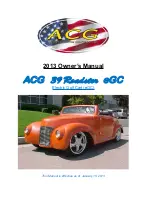
Page B-3
Repair and Service Manual
SAFETY
Read all of Section B and this section before attempting any procedure. Pay particular attention to all Notes, Cautions and Warnings.
(a) operational performance tests and evaluations during, and at completion of, the program.
5.1 Personnel and Burden Carrier Operator Responsibility
5.3.1
Operators shall abide by the following safety rules and practices in paras. 5.4, 5.5, 5.6, and 5.7.
5.2 General
5.4.1
Safeguard the pedestrians at all times. Do not drive carrier in a manner that would endanger anyone.
5.4.2
Riding on the carrier by persons other than the operator is authorized only on personnel seat(s) provided by
the manufacturer. All parts of the body shall remain within the plan view outline of the carrier.
5.4.3
When a carrier is to be left unattended, stop carrier, apply the parking brake, stop the engine or turn off
power, turn off the control or ignition circuit, and remove the key if provided. Block the wheels if machine is on an
incline.
5.4.4
A carrier is considered unattended when the operator is 25 ft. (7.6 m) or more from the carrier which remains
in his view, or whenever the operator leaves the carrier and it is not within his view. When the operator is dismounted
and within 25 ft. (7.6 m) of the carrier still in his view, he still must have controls neutralized, and the parking brake(s)
set to prevent movement.
5.4.5
Maintain a safe distance from the edge of ramps and platforms.
5.4.6
Use only approved carriers in hazardous locations, as defined in the appropriate safety standards.
5.4.7
Report all accidents involving personnel, building structures, and equipment.
5.4.8
Operators shall not add to, or modify, the carrier.
5.4.9
Carriers shall not be parked or left unattended such that they block or obstruct fire aisles, access to stair-
ways, or fire equipment.
5.3 Traveling
5.5.1
Observe all traffic regulations, including authorized speed limits. Under normal traffic conditions keep to the
right. Maintain a safe distance, based on speed of travel, from a carrier or vehicle ahead; and keep the carrier under
control at all times.
5.5.2
Yield the right of way to pedestrians, ambulances, fire trucks, or other carriers or vehicles in emergency sit-
uations.
5.5.3
Do not pass another carrier or vehicle traveling in the same direction at intersections, blind spots, or at other
dangerous locations.
5.5.4
Keep a clear view of the path of travel, observe other traffic and personnel, and maintain a safe clearance.
5.5.5
Slow down or stop, as conditions dictate, and activate the sound-producing warning device at cross aisles
and when visibility is obstructed at other locations.
5.5.6
Ascend or descend grades slowly.
5.5.7
Avoid turning, if possible, and use extreme caution on grades, ramps, or inclines; normally travel straight up
and down.
5.5.8
Under all travel conditions the carrier shall be operated at a speed that will permit it to be brought to a stop in
a safe manner.
5.5.9
Make starts, stops, turns, or direction reversals in a smooth manner so as not to shift the load, endanger
passengers, or overturn the carrier.
5.5.10
Do not indulge in dangerous activities, such as stunt driving or horseplay.
5.5.11
Slow down when approaching, or on, wet or slippery surfaces.





































